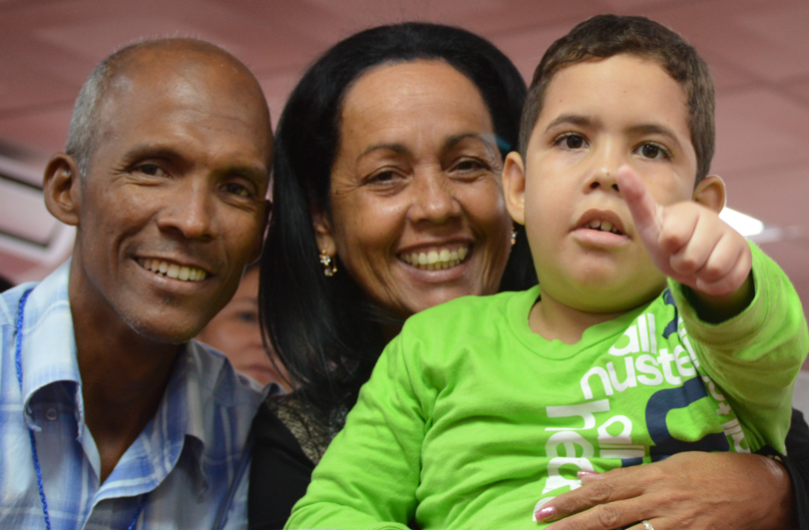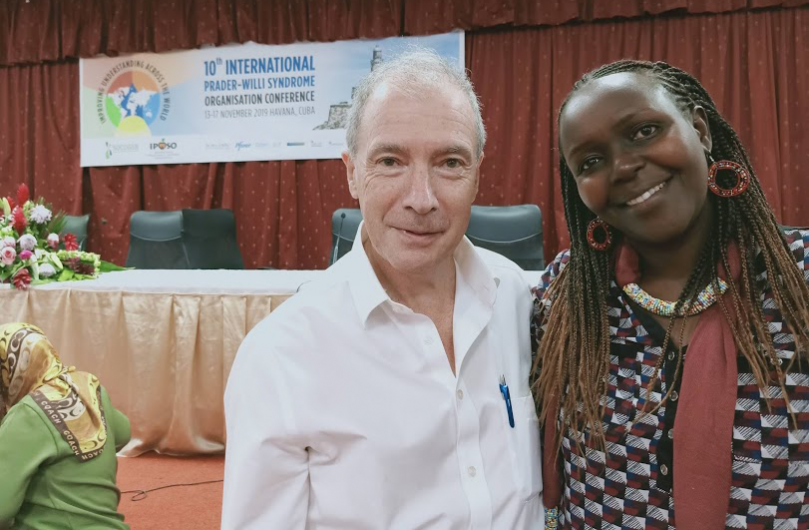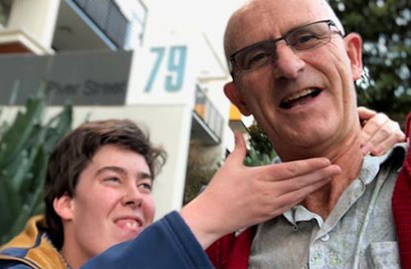Sex hormones, fertility and sexuality
Infertility was believed to be a characteristic of all adults with Prader-Willi syndrome (PWS) until 1999, when the first documented pregnancy was reported in a woman with PWS. Subsequently another three cases worldwide have been documented of women with PWS becoming pregnant. As of this writing, there have been no reports of fertility in men with PWS.
Hypogonadism and fertility
Hypogonadism with low levels of sex hormones (oestrogen in women and testosterone in men) is very common in PWS. A tight interaction between hormones from the hypothalamus, the pituitary, and the ovaries in women or the testes in men, regulates the levels of sex hormones. A normal level of hormones and a normal function of involved glands is necessary for sexual development and fertility. A dysfunction in any of these glands will result in hypogonadism and decreased/absent fertility. Sex hormones are also important for the growth spurt in puberty, for the development of secondary sexual characteristics, body fat/lean muscle composition, bone mineral density, and quality of life. In addition to the well-established hypothalamic dysfunction in PWS, recent studies have associated the hypogonadism with impaired function of the ovaries and testes. Therefore, the flaw may lie along the continuum from complete primary (ovaries/testes) hypogonadism to complete central (hypothalamus/pituitary) hypogonadism.
In the majority of women with PWS menarche (first menstruation) is usually absent or delayed up to the late 20’s. When menstrual periods occur, they are often irregular and, accompanied by infrequent or absent ovulations. Pseudo-menstruations, where the uterine mucosa is excreted due to oestrogen production in fat tissue, are also seen. The presence of menstrual periods whether induced by treatment with oestrogen or of natural onset does not indicate fertility, unless ovulations occur. Thus, most women with PWS are infertile, although the hormonal levels required for potential fertility may be present in some. In men with PWS, viable spermatozoas (necessary for fertility) have not been described. In both genders obesity or being overweight can lead to or worsen hypogonadism and infertility, presumably due to the production of oestrogen in fat cells hampering the function of the hypothalamus and the pituitary. Similarly, treatment with oestrogen and testosterone suppresses the secretion of hormones from the hypothalamus and pituitary gland. Conversely, a significant weight loss or change in medication might increase the hormone levels; there are reports of fertility in some women on serotoninergic agents, like fluoxetine. Of note, there is evidence to suggest that some psychotropic medications interact with the hypothalamus, pituitary and gonadal steroids at the level of the cytochrome P450 enzymes in the liver, which could potentially decrease or increase fertility.
Fertility is best evaluated by measuring relevant hormones. Typically, in adults with PWS the pituitary hormone FSH (follicle stimulating hormone) will be high with low oestrogen and testosterone levels in females and males, respectively. However, depending on which hormone-secreting gland is not functioning appropriately, different hormone levels can be seen. For example, the hormone inhibin B, from the ovaries and the testes, is associated with potential fertility. In most adults with PWS, inhibin B is undetectable, indicating infertility, but in some women detectable levels have been found, and fertility might be possible. In principle, evaluation of fertility in men requires the study of the ejaculate, but due to sexual dysfunction, cognitive and behavioral problems, obtaining ejaculate is usually not feasible. It is unknown what percentage of men with PWS are capable of an ejaculation, but the Clinical and Scientific Advisory Board (CSAB) of IPWSO is aware of two men who were able to produce ejaculate, and examination of both their ejaculates was negative for sperm.
Sex hormone treatment
In both genders sexual hormone replacement may be important for developing an adult appearance, for enhanced bone mineral density, for optimal muscle and organ function, and for gender specific brain maturation, altogether leading to an improved quality of life. Before initiating replacement of sex hormones, blood tests measuring relevant hormones are needed. After puberty sex hormone treatment may not always be advised to the specific individual with PWS, and a balanced discussion of the potential benefits and risks should be held with the patient and their caretakers.
In women, the well-known risks associated with oestrogen supplementation should be considered, particularly thromboembolism, which is already an increased risk in PWS and in obesity, as well as the risk of breast cancer, and mood instability. In men, the effect of testosterone on mood and behaviour needs to be recognised, although these may be dose related. An individualised approach to hormone therapy is the key. The goal of testosterone or oestrogen supplementation in PWS might not be to achieve the levels defined as within the normal range for those without PWS. For many, lower doses of sex hormones are sufficient to obtain the positive effects of the treatment. Treatment must be carefully monitored and adapted to the patient’s needs, starting with a low dose followed by a gradual increase. Parents and caregivers should be carefully informed, especially about the body changes in men, for example face and body hair, and deepening of voice, and spot bleeding from the vagina in females. In women, an important distinction between treatment of hypogonadism and birth control management needs to be explained. Importantly, fertility will not be gained by treatment with oestrogen or testosterone.
Sexuality
Despite the hypogonadism, the desire to get married and have children is very common in adults with PWS. Many express strong romantic thoughts and demonstrate an interest in sexual experiences. Some, both women and men, express thoughts, fantasies and behaviours that mirror their desires, such as playing with dolls as adults. An adult with PWS may develop maternal or paternal feelings following the birth of a niece or nephew, or may instead experience jealousy that their own parents have an intense interest in the new grandchildren and give them more attention than they do their child with PWS.
Romantic relationships may be perceived in many different ways by persons with PWS, and it is important to differentiate fantasy from a more actionable situation. Some may exhibit magical thinking, claiming to be engaged to be married (for example to a well-known pop star) and indicating that a marriage date has been set, even though they have minimal contact with, or personal knowledge of, the identified person. Others may have a real girlfriend or boyfriend and describe a dating relationship of variable intensity; they may be content to display affection through telephone contact, hand holding and kissing without actual sexual contact. A few may enter what can be described as a serious relationship that might include sexual intercourse, often with a partner who does not have PWS.
First, it is important to evaluate their level of understanding of sexual function and “where babies come from.” Second, their understanding of the rules and responsibilities, boundaries, and personal safety around sexual behaviour must be explored. Finally, their knowledge of the risks of sexually transmitted diseases must be assessed. Equally important is the need to ascertain whether sex is being exchanged for food or whether the person with PWS is being taken advantage of sexually; women with PWS are most at risk for the food-for-sex manipulation. If such sexual exploitation is discovered, a referral to the proper agency for investigation is required. Finally, individuals with PWS can display interpersonal conflict in their relationships. They may have difficulty sharing, meeting the expectations of others, or making empathic connections. Their level of emotional maturity may not be conducive to the level of judgment, commitment, and intimacy necessary in a marriage, even with the help of parents or guardians. Attempts at developing relationships may be further complicated by the poor judgment of some adults with PWS, developing stalking behaviours or erotomania, where a person nurtures a delusional attachment, believing that another is infatuated with them.
When young adults with PWS express a desire to have a baby this idea can be viewed as an early psychological stage of the family romance, such as playing with dolls. This wish can be acknowledged, discussed, and addressed through counselling. It is often managed through substitution, such as having a doll, being involved in the lives of nieces and nephews, being directly supervised in activities with small children, or accepting that not all adults in society have children. When the desire for a baby is complicated by actual menses with the possibility of fertility, it may be difficult for the woman with PWS to accept the use of contraceptives. In these cases, anticipatory guidance requires the involvement of the parent or guardian. Concerns about fertility in PWS raises many medical and ethical issues and appropriate anticipatory guidance, counselling and education is important. Family, religious and social values should play a major part in these discussions.
Pregnancy
Articles and narratives of the four known pregnancies in women with PWS suggest that the gestations and deliveries were uncomplicated. Three babies were delivered by planned caesarean sections. All of the mothers did not breast feed and they were unable to bond with the children. The infants were cared for by others, most often relatives. Common for all was an incapacity to put the needs of the child ahead of their personal needs and desires, especially about food.
The genetics of the children born to mothers with PWS has varied. Theoretically, the chance of a fertile woman with PWS having a non-PWS baby depends on what genetic type of PWS the mother has. A woman with PWS due to uniparental disomy (UPD) is not at risk of passing on a genetically altered chromosome 15 for PWS. A woman with PWS due to a deletion has a 50% chance with each pregnancy of passing on the chromosome with the deletion and having a baby with Angelman syndrome (AS). AS results from deletion or mutation of the maternal chromosome 15 (q11-q13 region), so if the mother passes along her own maternally derived chromosome 15, the baby will be unaffected; but if she passes on her paternally derived chromosome 15 with the deletion instead, then the baby will have AS. Characteristic symptoms of AS are severe developmental delay and/or intellectual disability, little or no speech, movement and balance disorders, and a unique behaviour with an inappropriate happy demeanour that includes frequent laughing, smiling, and excitability. Many have profound sleeping problems and epilepsy. In the four documented cases of pregnancies in women with PWS, two of the children had normal chromosome 15 (mothers had deletion and UPD, respectively), the other two had AS (mothers had both deletion).
In summary:
- Sex hormone replacement can be an important treatment option that should be considered.
- Sex hormone treatment is not advisable for everyone and an individualised approach is important, particularly in regards to dosages that might be lower than standard doses.
- Fertility is not gained by treatment with sex hormones.
- Assessment of fertility/pregnancy for those in sexual relationships is necessary, since infertility cannot be considered as absolute.
- Care should be taken to prevent exploitative relationships, and secure prevention of sexually transmitted diseases.
- Much more knowledge is needed on treatment of hypogonadism, sexuality and fertility in PWS.
Page updated February 2021.
International Community
IPWSO was established so that PWS associations, families, clinicians and caregivers around the world could exchange information and support and have a united global voice under one umbrella.
Information for Medical Professionals
The latest medical and scientific research and information, plus guides into common medical issues affecting people with PWS.



